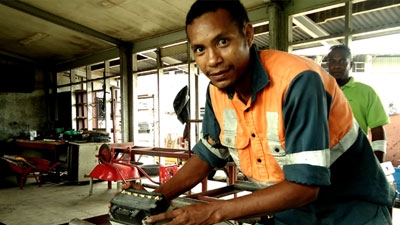Challenge
In Port Moresby, the largest city in PNG, youth between the ages of 15 and 29 represent about 35 percent of the population. It is estimated that the youth cohort will grow by at least another 13 percent by 2015 due to natural population increases and immigration. The combination of rapid demographic growth and urbanization creates tremendous pressures for employment generation. Three underlying issues pose significant challenges for the youth:
i) Their lack of equity in and access to the formal primary and secondary education;
ii) Their lack of equity in and access to the labor market; and
iii) Their increasing involvement in urban crime and violence.
Solution
The Urban Youth Employment Project aims to provide urban youth in the capital Port Moresby with income from temporary employment opportunities and to increase their employability through:
- Youth Job Corps supports: i) the identification and selection of disadvantaged, unemployed youth from the National Capital District; ii) life skills for employment training; and iii) public works job placement. Approximately 13,500 of these youths will then undertake a two month work placement on a public works sub-project.
- Skills Development and Employment Scheme (SDES) provides On-the-Job Training and market oriented work experience for around 4,000 participating youth. The SDES consists of two Pre-Employment Training (PET) programs followed by On-the-Job Training. One of the PET programs provides opportunities for about 2,000 youths and focus on trade, industrial and commerce related employment. The other provides opportunities for another 2,000 youths and focus on basic bookkeeping, data entry, business practices, and information technology.
Results
As of May 2013, the project has achieved the following:
- Consultation and awareness activities in 11 locations across the National Capital District have resulted in 3,000 applicants to be screened to participate in the program.
- Provide training in basic life skills for 1,300 youth.
- Half of 250 youths who graduated from the pre-employment training in March 2013 have been placed in on-the-job training with public and private employers in the National Capital District.
Bank contribution
The International Development Association has contributed $15.80 million for this project.
Partners
Partners involved with the project include the Government of Korea which has contributed $0.6 million and the Government of Papua New Guinea which is providing additional co-financing in the amount of PGK1 million per year.
In March 2016, the Australian Government provided additional financing of $10.8 million to extend the project until the end of 2018. The project’s main implementing agency is the National Capital District Commission of Papua New Guinea.
Moving forward
The additional funding and expansion of UYEP will ensure the project can open opportunities for up to 15,000 unemployed young people by 2018 to help them find positive long-term employment. The project supports the government’s broader agenda of promoting income generation opportunities as well as the development of a youth strategy to address the issues of youth unemployment and exclusion.


